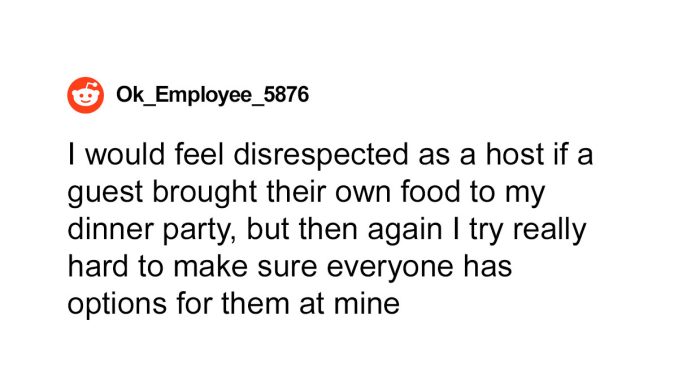
Family get-togethers can be tricky, and sometimes, instead of bringing people together, dinner can only add to their disagreements.
A person under the nickname Ok_Employee_5876 made a post on Reddit, asking if it would be disrespectful to bring their own food and grill to their in-law’s BBQ party.
While this may sound excessive, they claim that the hosts knew about their allergies, but still devised a menu that was unsuitable, for them, so there are not many options left.
This person was invited to their in-laws dinner party
Image credits: Thiago Rebouças / pexels (not the actual photo)
But they realized the hosts disregarded their food allergies
Image credits: wirestock / envato (not the actual photo)
Image source: Ok_Employee_5876
Usually, having an honest conversation with the hosts can really help navigate these situations
While the internet can sometimes be of help, the author of the post should first talk to their partner and consider what they believe to be the best approach.
“Families can have rather strange boundaries,” Dr. Ramani Durvasula, a psychologist who specializes in relationships, said. “When an in-law enters a new family situation, he or she inherits those boundaries and the problems associated with those boundaries, [which] can manifest in lots of ways.”
Expectations for how to manage things — such as holiday plans, child-rearing, visiting frequency, home presentation, and even work balance — can also contribute to disagreements because these unmet expectations, at either end, are a breeding ground for anger, frustration, sadness, and other messy emotions.
“Unmet expectations strain all relationships, but the stakes are high in in-law relationships because they are stakeholders in your marriage, and your children if you decide to have them, as well as your household and even issues like finances,” Dr. Durvasula added.
Being on the same page with your partner helps to bridge these gaps, especially on topics that are particularly contentious with your in-laws.
“A united front makes a huge difference,” Dr. Durvasula explained. “You do not want to be figuring things out on the fly with your spouse while in the crosshairs of your in-laws. If you and your spouse are on the same page, then you can take the path of least resistance with in-laws and just smile politely and say ‘sure,’ but then do things the way that you and your spouse believe [are] appropriate.”
Either way, Stefanie Grauer-Stojanovic, who is a German cookbook author, blogger, and nutritionist specializing in allergies and food intolerances, believes that your best option in such situations is honesty.
“After you have been invited, you should speak to the hosts as soon as possible,” she wrote. “It takes a bit of courage and honesty, along with tact. I know it’s not always easy, especially in business settings or at the beginning of new friendships. It can also be difficult when your children are invited to parties and you don’t really know the hosts at all.”
But if you speak to the hosts in person – by telephone rather than email – you can find out right away what their attitude is.
“I recommend initiating the conversation by thanking the host for the invitation and then ‘laying your cards on the table,’” Grauer-Stojanovic said. “Remain calm and use short, clear sentences to make sure you are easily understood. It might be the first time your host has had to deal with allergies, intolerances, or dietary restrictions.”
“It will not be necessary right away to go into more detail over the phone. You can always say more about it once you are there, whenever you feel like it, and if the guests and the hosts are interested.”
Image credits: Pixabay (not the actual photo)
As the story went viral, its author provided more information on what was happening in the comments
And many people said they were, indeed, in the wrong
A few supported the invitee
Some claimed that everyone involved could’ve been more empathetic
The post Person Asks If They Would Be Wrong For Bringing Their Own Food To In-Laws’ Dinner Party first appeared on Bored Panda.
